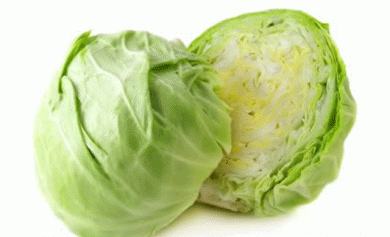
Have you ever wondered why nutritionists recommend that we cabbage? The vegetable contains vitamins and other essentials for growth and healthy skin. The cabbage is known for its dark green leaves and white stem. There are varieties of cabbage namely: savoury, nappa, Chinese, red and green cabbage. It can be eaten raw, stemmed or fried. When shredded in small pieces, cabbage can be added to salad, jollof rice, fried rice and pastries. It can even be eaten with a mixture of sour cream.
?
For best results, avoid cutting the cabbage and living for a longer period before use, so as not to lose the vitamin content. The leaves in the bunch are usually tight and do not need to be washed seperately. Just remove the damaged, exterior leaves, cut into four or five parts with a knife and wash in salt water. The best way to cut the cabbage is using a sharp knife to slice it into attactive,tiny parts.
Remember, do not cook cabbage in an aluminium pot, because it gives rise to a chemical reaction that discolours the vegetable and compromises its flavour. Cook in a stainless pot.
?
Benefits Of Cabbage
Cabbage reduces the risk of developing colon cancer. Studies have shown that people who eat large quantities of cabbage have less chances of developing colon cancer, because of its high fibre content and essential chemicals. Fiber helps maintain healthy intestines by increasing our transit movements.
Cabbage contains chemicals that inhibit tumour growth and protect cells against free radicals.
Some of its chemicals are believed to speed up the body’s metabolism of estrogens and therefore reduce the incidence of breast, uterus and ovarian cancer.
Cabbage is an excellent source of vitamin C and beta-carotene (vitamin A pre-cursor). These anti-oxidants are helpful in fighting free radicals that are circulating within the body and increase our process of aging. High amounts of beta-carotene may cut the risk of cataracts.
Raw cabbage is a good source of folic acid which lowers the risk of having babies with ‘spinal bifida’.
?
Juiced cabbage aids in healing ulcers.
Cabbage also reduces the risk of developing heart disease, stroke as well as alleviating rheumatisms and skin problems.
It has low calories.
?

